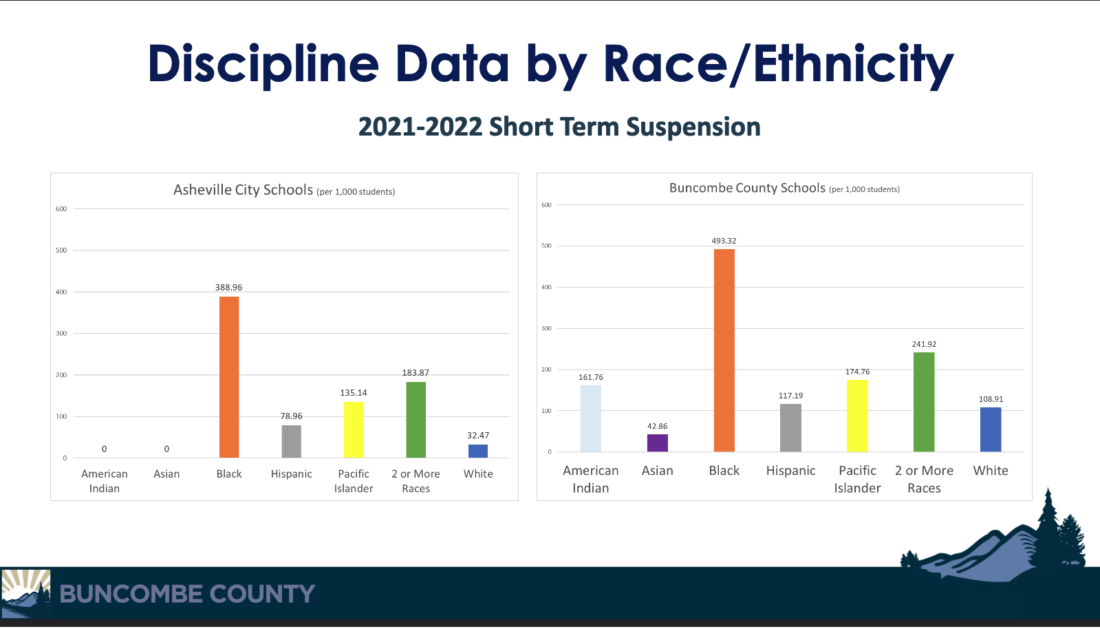The COVID-19 pandemic disrupted education for every student in the Asheville and Buncombe County school systems. Data presented to the county Board of Commissioners Feb. 7 suggested that disruption has hit Black children even harder than those of other races.
During an annual check-in regarding Buncombe’s strategic goals for education, Rachael Nygaard, the county’s strategic partnerships director, said the pandemic had driven general upticks in chronic absenteeism and disciplinary issues while lowering graduation rates. Yet on every measure of performance she presented for the 2021-22 academic year, across both school systems, Black students fared worse than did white ones.
Black students had chronic absenteeism rates of 49% and 38% in city and county schools, respectively; for white students, those rates hovered around 20%. Rates of short-term suspensions were nearly 12 times higher for Black students than white pupils at Asheville schools and over 4.5 times higher in the Buncombe system. Black graduation rates also fell below those of white students.
Regarding academic achievement, just 11% of Black students in grades three through eight at Asheville City Schools scored as proficient in math, with 13% proficient in reading. Rates were somewhat better in the county system, with 21% of Black pupils proficient in both subjects, but still fell well below those of white, Hispanic and Asian students. As previously reported by Xpress, the achievement gaps for the city schools have long been among the worst in state.
Commissioner Al Whitesides voiced his robust displeasure over the numbers.
“As a Black man, I’m appalled,” Whitesides said. “Every year it’s the same story — we spend over $100 million in funds. … I’m just starting to see why people are down on public schools. We spend the money but we don’t get anything out of it.”
Meanwhile, Commissioner Amanda Edwards homed in on the discipline figures. She said there needed to be additional discussion about how to assess appropriate punishments for students.
“The consequence shouldn’t be heavy-handed,” she said. “We need to look at the specifics of what happened.”
Buncombe County Schools Superintendent Rob Jackson and Asheville City Schools interim Superintendent Jim Causby were both present at the presentation. Addressing the board, Causby acknowledged the numerous perils and setbacks of the pandemic, saying that lingering damage to students would have to be addressed.
“Not being in school, they missed high-quality education,” he said. “When you’re not face to face, the educational opportunities fall.”
Whitesides encouraged the superintendents to “surprise [him]” and come forward with better numbers at the next annual check-in.
In other news
At the board’s regular meeting later that day, commissioners unanimously passed a resolution to move ahead with an audit regarding local government’s treatment of Black residents, as recommended by Asheville’s Community Reparations Commission last year.
The resolution says the audit, which will be conducted by an outside firm, will probe “intentional and unintentional harm committed against the African American community.”
Asheville resident Jonathan Wainscott brought the issue up during the meeting’s public comment portion. He posited that whichever firm is eventually selected for the audit should look with a critical eye at the county board itself, noting that the area’s elected officials have long been predominantly white.
The board also unanimously approved its 2023 legislative agenda. The priorities, which were first discussed publicly during a Jan. 30 special meeting, include more support for early education programs and fighting against proposals that would limit Buncombe’s ability to regulate short-term rentals.






Mabe it’s not the school system’s fault.
“…should look with a critical eye at the county commission itself, noting that the area’s elected officials have long been predominately white.” Given this area’s demographics, wouldn’t it be super weird if this wasn’t the case?
Maybe we should take a look at most people representing the city and county especially in education are liberal Democrats.
You mean like in the city of Asheville, where 15% of the population is represented by 57% of the council?
We can thank the teacher’s union, some teachers, some parents, the Board of Ed, and other local, state and national administrators as well as health care officials for these problems. Their extreme overreaction to the pandemic left our students on their own. They followed their usual scholastic tendencies. In general, poor(not referring to socioeconomic status) students got worse, middle students faired a little better and good students were least affected. As a result, the gap between poor and better students has increased and behavior problems are now on the rise. In the future we should look more toward the welfare of all our students, get extra help for those that need it and let those that can, run as fast and far as possible. Most importantly we should keep our political biases and unfounded fears out of classroom decisions.
So according to the report the group with the highest attendance to school ranked the highest. The high rate of absenteeism for whatever reason can be directly reflected in these scores.
When do we get to talk about the elephant in the room – the parents of these failing black kids? When do we stop treating them all as perpetual victims and start expecting better parenting? Without accountability, regardless of skin color, this appalling situation will never, ever change.